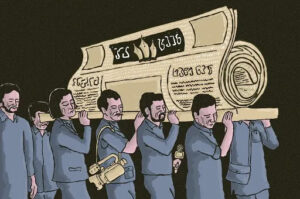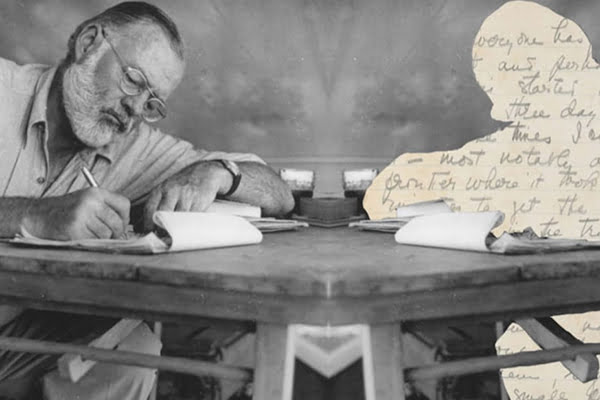
Disappearing media
This is the 199th edition of SHuSH, the official newsletter of the Sutherland House Inc.

“What made you decide to write about that?” I get the question a lot. I suppose most non-fiction writers do, although the answer is often obvious. A medievalist writes about Charlemagne or Prester John. A chef writes about soufflé. A memoirist writes about himself. Writers are told to write what they know. Most non-fiction books involve just that. It has never really worked for me. I don’t know anything. There’s an old line about journalists: they know a little about everything and a lot about nothing. Fits me perfectly. To the extent that I do know something, say, about Canadian public affairs, it’s because my day job has involved Canadian public affairs for as long as I’ve been working. The idea of going home after a day’s work and thinking or writing still more about Canadian public affairs is unappealing. I need to escape in place and/or time if I’m going to keep at it. I have written three books without being an expert on any of my subjects, although I did have a reasonable grounding in news media at the time I wrote The Uncrowned King: The Sensational Rise of William Randolph Hearst. I had been the editor of the National Post and I’d read a bit of newspaper history. I knew just enough about nineteenth-century newspapering, and Hearst (below) himself, to be fascinated that in his twenties he moved from San Francisco to New York for the express purpose of starting a newspaper war with the great Joseph Pulitzer. I had an inkling that what happened in that war—“the yellow years” of the American press—shaped the business models and editorial practices and news values that have prevailed ever since. That was about it.
 |
The lure of the project was what I didn’t know. What the fuck was Hearst thinking taking on the undisputed king of newspapering on his own turf, and on his own terms – launching a popular broadsheet newspaper, the New York Journal, to compete with Pulitzer’s New York World, the most popular broadsheet newspaper ever published? Why was he able to succeed? And why, despite his early success, did his wildly provocative and entertaining style of newspapering soon fade away, leaving two relatively tepid dailies, the New York Times and the Wall Street Journal, to define journalistic success as the century rolled on? I had never actually seen one of Hearst’s or Pulitzer’s newspapers before I started the project. By the end of it, I’d seen almost every edition of both papers between 1895 and 1901 and, more importantly, I’d answered all of my questions about what had happened during the mother of all newspaper wars, and figured out my own ideas about what newspapers are for, and how the business evolved. All very satisfying. I intended, on finishing Hearst, to write another book about media or American culture, maybe going further back in time. I thought about doing the James Gordon Bennetts, father and son proprietors of the New York Herald and the inventors of popular American newspapering (the younger Bennett is the craziest of all the crazy bastards the business has attracted, or produced… it’s a chicken-and-egg thing).
 |
I thought about P.T. Barnum, the sometimes brilliant, sometimes phony, always cunning mid-nineteenth-century impresario who can be blamed or credited for practically everything that’s since happened in American entertainment. And I thought about writing about one particular 1906 number of McClure’s monthly magazine containing important features by Ray Stannard Baker, Ida Tarbell, and Lincoln Steffens. For my money, it is the single best edition of any publication ever produced, and the high watermark of American journalism. I wanted to trace how it came together and the enormous impact it had. I had one other idea. I’d heard some author, probably David McCullough, say that he was always alert in his reading for new book ideas and whenever anything struck him as a possibility, he wrote it down, ran to the library, and looked in the card catalog to see if anyone else had written about it. (Pre-internet, obviously). I took this advice to heart.
 |
After Hearst, most of my reading was in early-twentieth-century history. There were big gaps in my understanding of those years and I wanted to fill them. I started reading about the Great War, from Barbara Tuchman’s The Guns of August to Margaret MacMillan’s Paris 1919. I read dozens of books and kept running across references to an incredibly dynamic and competent American businessman in London named Herbert Hoover. He seemed to be everywhere, always doing great things. I learned that he’d almost singlehandedly fed the nation of Belgium for the first years of the war and was credited with saving some eight million lives. It was a fantastic thing to have done, and I thought there must be a book in it. I looked on Amazon and found an excellent scholarly treatment of Hoover’s wartime adventures but nothing intended for a general audience. I put Hoover’s Belgium years on my list of potential subjects and arranged a meeting with my agent. The agent listened to my ideas. He told me not to do another newspaper book or I’d get myself pigeon-holed as “the newspaper guy.” I was going to object that the British author Robert Harris had done a wonderful media trilogy (one book on the fake Hitler diaries, another on tabloid coverage of the Falkland War, and another on Margaret Thatcher’s press secretary) but the impatience in the agent’s eyes sapped my confidence. I tried Barnum. He liked it better. I tried Hoover. He liked it too. “So which one,” I asked. “Which one do you want to do?” “Hoover, I guess.”
 |
And that was that. Except that we couldn’t sell a book on Hoover’s Belgian adventures (that’s him above, left). We could only sell his whole life. I didn’t want to do Hoover’s whole life. I didn’t know much about him beyond that he’d been born during the presidency of Ulysses S. Grant and had outlived John F. Kennedy by a year, and that I’d have to do a lot of deep research into not only the Great War but the Roaring Twenties, the Hoover presidency, the Great Depression, the Second World War, and much else. It was daunting as hell. But very interesting. And I didn’t have much of a choice given that no one wanted the Belgian book. I signed on for the full biography: Hoover: An Extraordinary Life in Extraordinary Times. With Hoover out of the way, I started looking for another subject. I was still interested in Barnum. I put him on the new list. Also Leland Stanford. Hoover had been the very first student at Stanford University, founded by one-time governor of California in memory of his son, Leland Stanford Jr., who died young. I was curious about Stanford not only because of his son and the university but because almost everything interesting in California history, from the vineyards to motion pictures, seemed to run through him. He made the list. I also thought it would be interesting, having been steeped in the first half of the twentieth century, to find a new subject in the second half.
 |
I was a child in the 1960s and I’d absorbed things about the decade through newspaper headlines and televisions shows, almost by osmosis, as kids do. The further I got from those years, the more curious I was to know more. I started reading deeper into the 1960s. Meanwhile, my career took a detour. By a bizarre series of events, I found myself plucked out of the magazine business to run a public policy shop at a large telecommunications company. Public policy is important to telecoms because they are regulated by government. The whole regulatory scene was entirely new to me so I started reading up on it. Or, rather, I started reading back on it, trying to understand the origins of government regulation of business. Why had government thought it necessary? What was government trying to accomplish? Did it work? It turned out that modern business regulation started in the 1960s. In all my reading about the 1960s, I could find very little about business, let alone its regulation. There was a lot about civil rights, the women’s movement, the Vietnam War, the counterculture, but next to nothing about business beyond that corporations were extremely unpopular by the end of the decade.
 |
It turned out that a pivotal moment in the business history of the 1960s was a clash between consumer advocate Ralph Nader and General Motors over traffic safety (the Chevrolet Corvair, above, was Nader’s chief exhibit). It ended with GM, the flagship of the American free enterprise system, the largest and most successful corporation in the history of the world to that point, excoriated over the unsafe designs of its automobiles and federally regulated for the first time. I had vague memories of GM being accused of spying on Nader and using beautiful women to lure him into compromising situations. GM’s antics were one of the major reasons that big business was unpopular by the end of the decade. I thought it would be interesting to trace how GM could get the safety issue so spectacularly wrong when 50,000 people were dying on America’s highways every year. How could so smart a company be so stupid, so callous? That, too, went on the list. I sat down with the agent. “I think you’ve got your three next books,” he said. “So which should I do?” “You seem most excited about the car book.” And that was that. I turned it in last fall. It turned out to quite a different book than what I’d initially intended. My ideas about what had happened between Nader, the federal government, and GM didn’t survive the evidence. The book is now called The Sack of Detroit. Due to pandemics and elections, it won’t be out until next spring. The first thing I did after delivering the manuscript was to look back on my old lists of book ideas to see if there wasn’t something on them screaming to be done next. There wasn’t. Robert Wilson, editor of The American Scholar, published Barnum: An American Life last year and it’s a fabulous book. Also last year, Robert De Wolk wrote American Disruptor: The Scandalous Life of Leland Stanford. And Doris Kearns Goodwin spent a lot of time on McClure’s magazine in her recent The Bully Pulpit. There’s still the Gordon Bennett’s but nobody cares about newspapers anymore. So I’m back to reading and making new lists. I’ve got a long one, about twenty different ideas, including some Canadian stuff which is more appealing these days because I’m no longer heavily involved in Canadian news. I’ll winnow the list over the summer and make another appointment with the agent in the fall. All of which is to say that while it’s not bad advice to write what you know, there is a lot of delight and adventure in writing what you don’t know or, rather, what you want to know.

This is the 199th edition of SHuSH, the official newsletter of the Sutherland House Inc.

There was an interesting piece in the New York Times a week or so ago about James Daunt (above), the incoming chief executive of Barnes & Noble, the most important bookstore chain in the English-speaking world. It didn’t quite get to the nub of the matter. Barnes & Noble has

The world of non-fiction from Sutherland House ( and Beyond )